Hundreds of digital marketing courses promise to help you improve as a marketer. The key is finding and choosing one that matches your goals, experience level and learning pace.
In this article, you’ll discover 11 of the top courses to refresh your memory, learn new skills and grow your business.
Key takeaways for digital marketing courses
Digital marketing courses are online or in-person programs that develop skills in SEO, social media, email and analytics.
Digital marketing courses offer flexibility and expert insights, but vary in cost, quality and credentials.
To get the most value from your course, set clear objectives, practice what you learn and apply lessons directly to real projects.
Pipedrive Academy provides free, practical courses to enhance marketing and sales skills that’ll help scale your company.
11 top digital marketing courses: a quick overview
Here are some starting points to save you from spending hours trawling hundreds of online course landing pages.
In no particular order, here’s a quick overview of 11 of the best digital marketing courses and what they cover:
Digital marketing course | What it covers |
Fundamentals of digital marketing (Google) | The basics of online marketing, from search ads to analytics. |
SEO essentials (Semrush) | Core search engine optimization (SEO) principles, keyword research and on-page optimization using Semrush tools. |
Content-led SEO with Brian Dean (Semrush) | How to create and promote content that ranks, taught by one of SEO’s top practitioners. |
Content Marketing University (CMI) | Strategy and execution for building effective content marketing programs at scale. |
Meta Blueprint (Meta) | Advertising on Facebook and Instagram, including audience targeting and campaign setup. |
Social media marketing course (DMI) | Platforms, artificial intelligence (AI) tactics and building and managing social media campaigns. |
Email marketing course (Pipedrive Academy) | Writing, designing and automating email campaigns that drive engagement and sales. |
Learning PPC with Google Ads (LinkedIn Learning) | Setting up, optimizing and tracking pay-per-click (PPC) campaigns with Google Ads. |
Digital marketing strategy (University of Edinburgh) | A structured approach to planning, executing and measuring digital marketing initiatives. |
Google data analytics professional certificate (Coursera) | Foundations of data analysis, visualization and reporting for marketing and business roles. |
SEO link-building course (CXL) | Practical link-building strategies to grow domain authority and organic traffic. |
1. Fundamentals of digital marketing: Google
Google’s digital marketing fundamentals course teaches new marketers and business owners how to get their company online, reach more potential customers and refine marketing approaches.
Use this accessible course to learn how real companies apply these concepts to solve your own challenges.
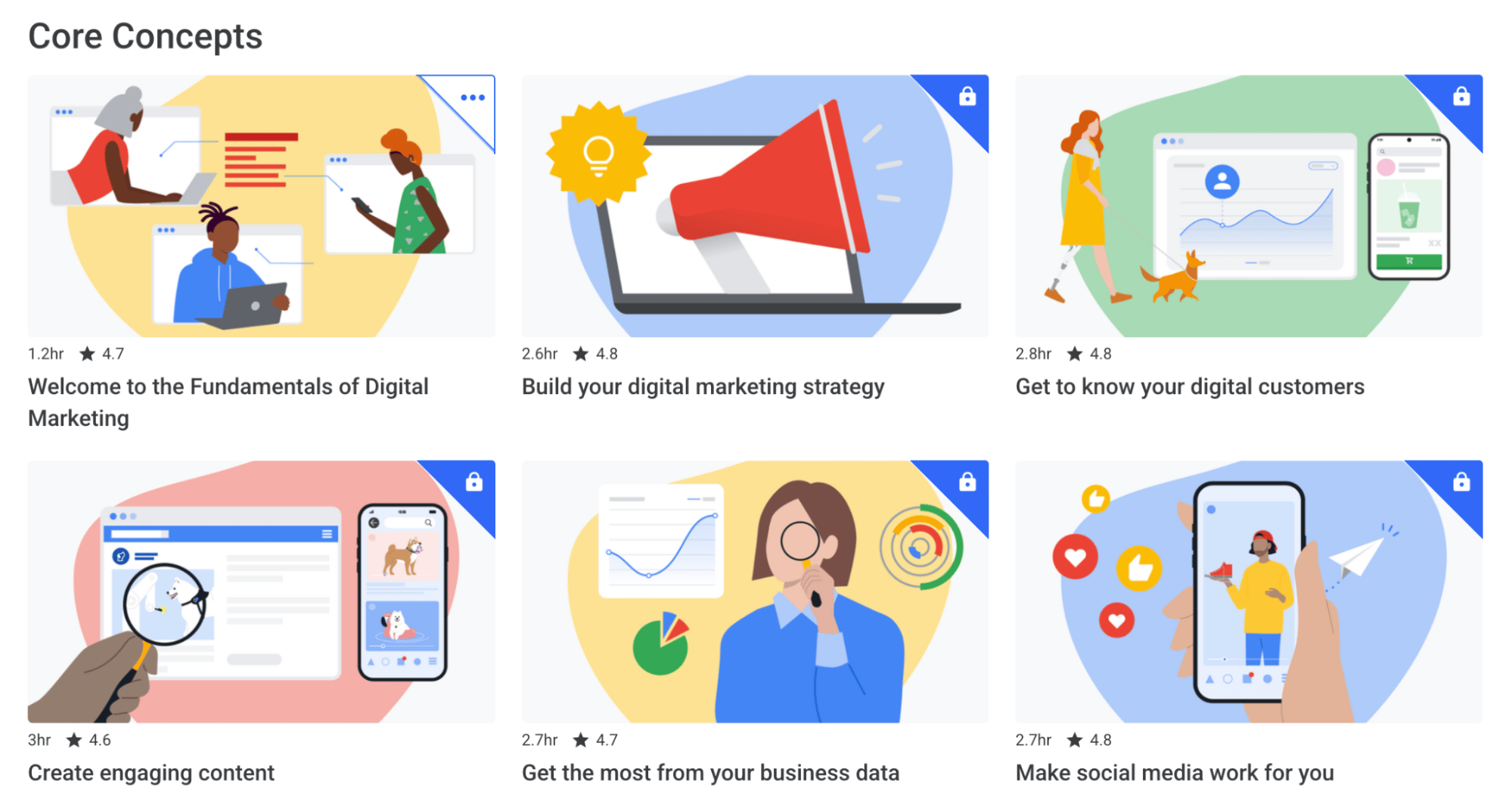
By completing the lessons, you’ll gain practical skills and a recognized certification that can boost your resume and get your business in front of a larger digital audience.
Modules: Some 17 units cover everything from search engine marketing (SEM) and SEO to social media, AI tools and e-commerce.
Target audience: Beginners looking to gain a basic but well-rounded understanding of digital marketing tools, campaigns and techniques.
Teaching methods: Unlimited access to a mix of recorded video tutorials, practical exercises and real-world examples.
Certification: Learners gain certification by passing a final exam when ready.
Course length: 40 hours, at your own pace.
Cost: Free (with a Google account).
2. SEO essentials: Semrush
Semrush’s SEO essentials course teaches foundational concepts and strategies for beginners to grow an online presence.
In less than a couple of hours, get a high-level walkthrough of how to use Semrush’s toolkit to:
Do keyword research
Get backlinks
Improve your site’s technical SEO
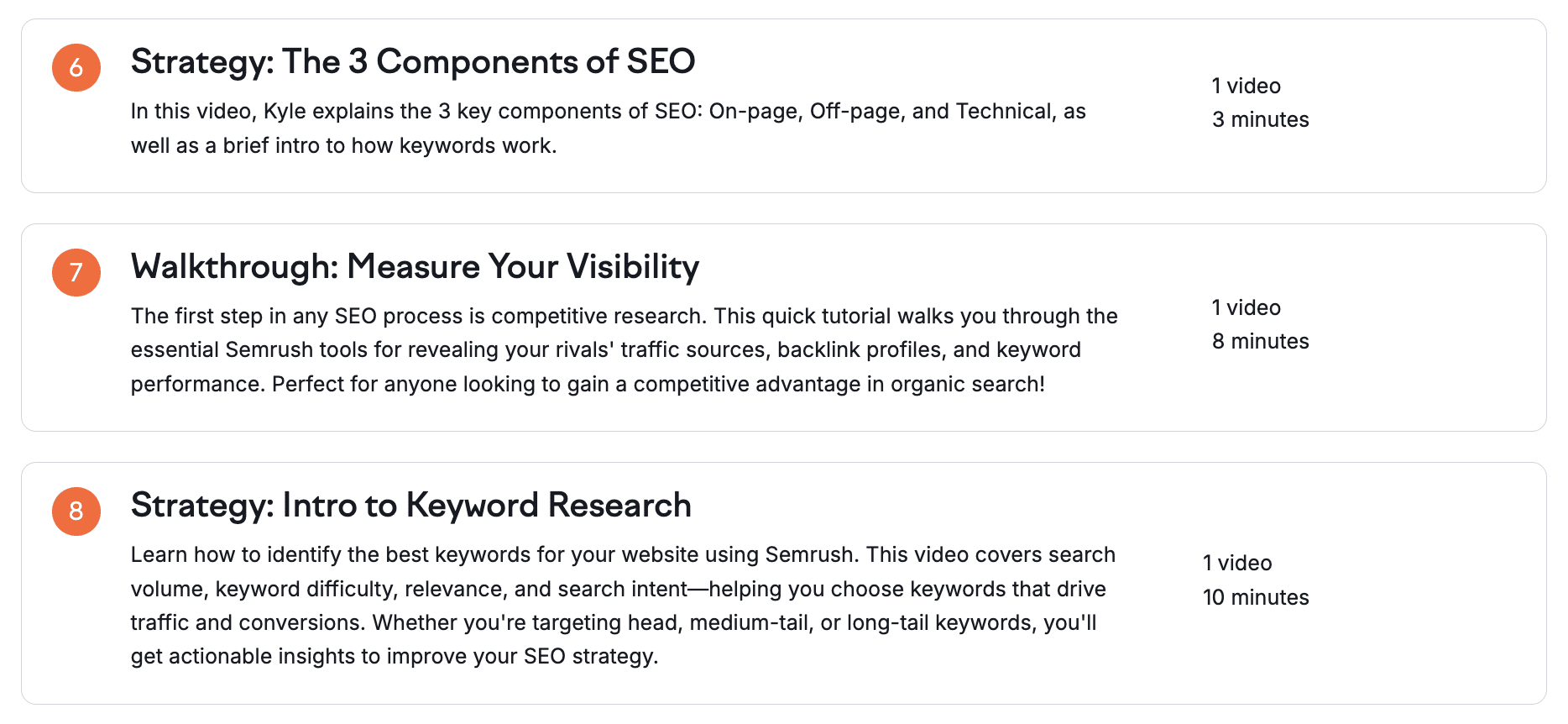
Upon completion, apply best practices to improve your website’s visibility and search engine rankings.
Modules: Around 16 short video lessons covering topics like keyword research, technical SEO, content optimization and backlink identification.
Course length: Under two hours, self-paced.
Target audience: Business owners and new marketers with little or no digital marketing experience.
Teaching methods: Video lessons with Semrush experts, with handpicked research materials and quizzes.
Certification: Learners receive a certificate after passing the final exam.
Cost: Free (with a Semrush or Google account).
3. Content-led SEO with Brian Dean: Semrush
Semrush’s content-led SEO course is ideal for those who know how search engines work and want to get their content to the top of Google’s search engine results pages (SERPs).
The course’s leader is a significant selling point. Brian Dean is an SEO expert and the founder of Backlinko (a marketing insights newsletter with more than 180,000 subscribers).
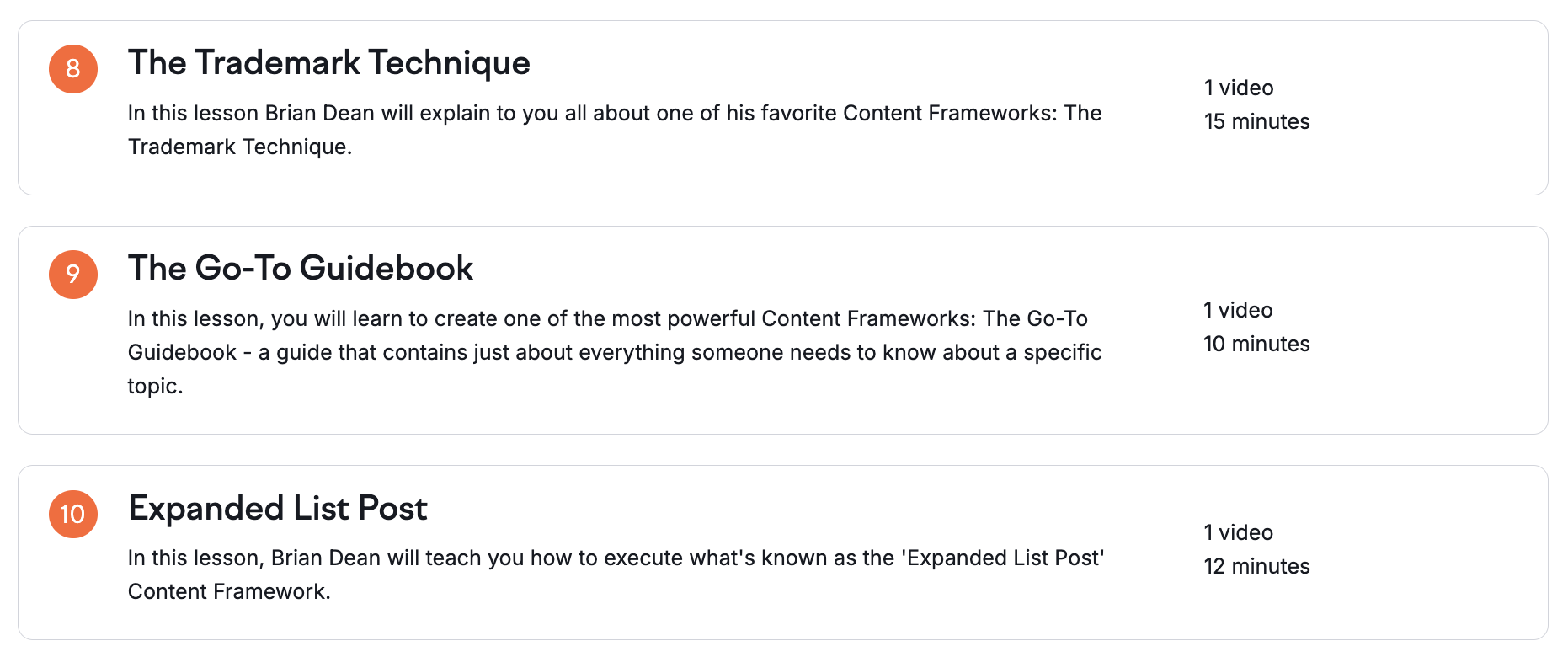
Learners walk away with practical strategies to create search-optimized content that drives traffic, builds authority and boosts conversions.
Modules: Some 27 modules covering subjects like content creation, copywriting, content promotion, link building and user experience (UX).
Course length: Roughly 5.5 hours, self-paced.
Target audience: Marketers and business owners who want to drive more traffic to their websites by creating search-friendly content.
Teaching methods: On-demand video tutorials led by Brian Dean with supporting worksheets and actionable tips.
Certification: Learners get a certificate after passing the final exam.
Cost: Free (with a Semrush or Google account).
4. Content Marketing University: CMI
Content Marketing Institute (CMI) University is an in-depth training program detailing all aspects of content marketing.
It equips marketers with actionable frameworks to plan, create and measure content that drives real business results.
Chief strategy officer Robert Rose leads this masterclass, with industry experts delivering a detailed and valuable core curriculum.
Note: As CMI University continually evolves to incorporate industry trends and changes, you won’t learn outdated methodologies or skills.
Modules: Some 11 core learning sessions cover content strategy, audience profiles, storytelling and performance measurement. Five further elective modules teach topics like business-to-business (B2B) lead generation and writing for your LinkedIn profile.
Course length: Over 11 hours of self-paced course content, with 12 months from enrollment to completion of the core modules.
Target audience: Beginners to experienced marketing professionals who want to learn the frameworks of content marketing and keep up with trends.
Teaching methods: A series of instructor-led videos with transcripts, slideshows and exercises.
Certification: Learners receive a certificate of completion after completing all mandatory modules and quizzes.
Cost: A paid course for individual learners, with discounts for AMA members and groups.
5. Meta Blueprint: Meta
Meta Blueprint (or Facebook Blueprint) is an e-learning platform for Facebook and Instagram business users.
Learn how to quickly master crucial elements of both tools to run more effective campaigns and grow your audiences.
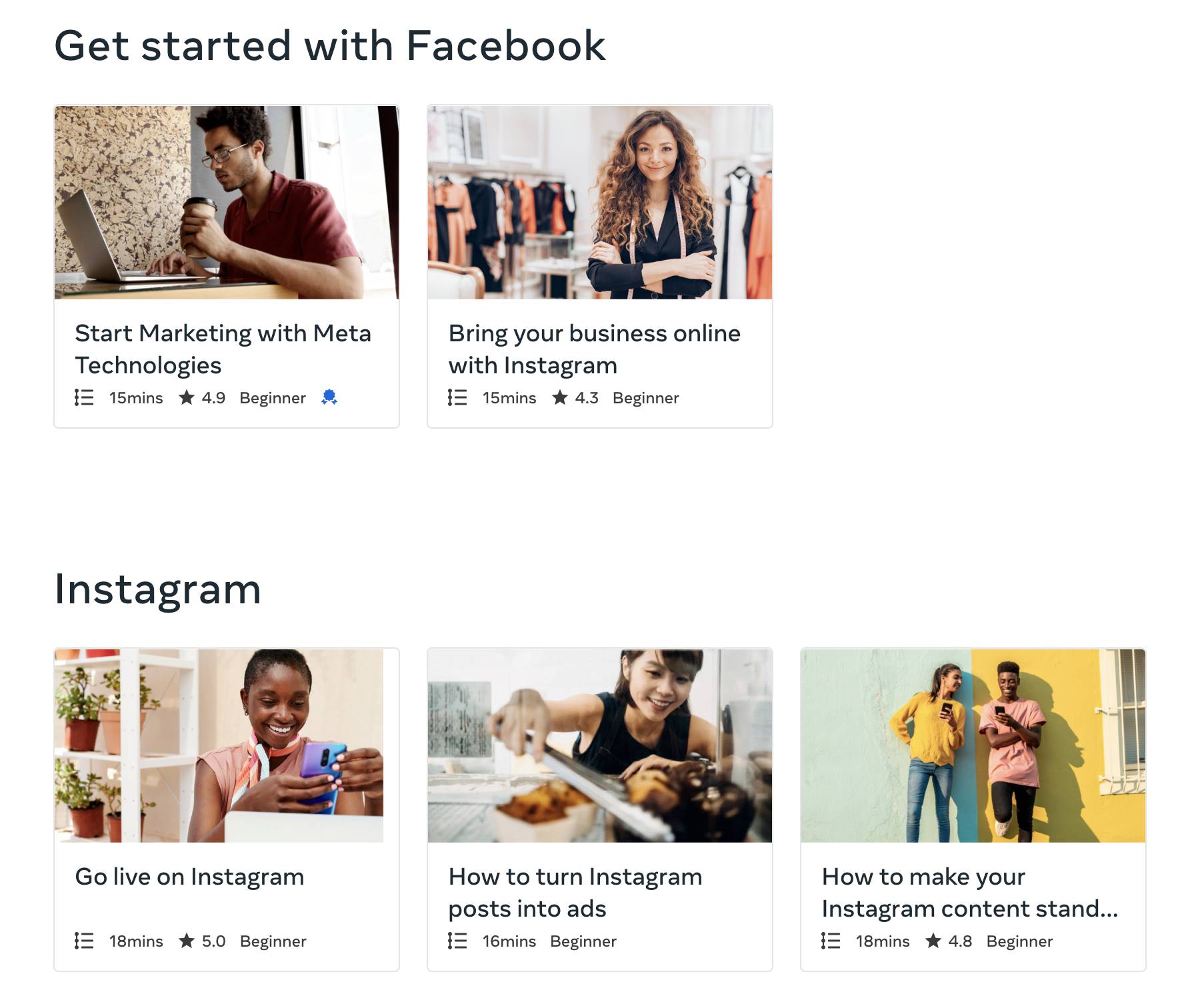
The mini-courses focus specifically on maximizing the potential of two of the most powerful social media marketing channels, from ads to visual tips.
Modules: Around 12 short courses, organized into topics such as “Go live on Instagram” and “Manage your ad campaigns”.
Course length: Short courses are around 15 minutes long and self-paced.
Target audience: Business owners and digital marketing professionals at all levels who use Facebook and Instagram to share content, build communities and promote products with ads.
Teaching methods: A mix of text, imagery and video content for each module, with “Knowledge Check” quizzes to finish.
Certification: Learners can become fully “Meta-certified” by taking additional, in-depth exams.
Cost: The e-learning platform is free to access (with a Facebook account), with paid professional Meta Certification exams.
Download Your Sales and Marketing Strategy Guide
6. Social media marketing course: DMI
The Digital Marketing Institute (DMI)’s social media marketing course is for marketers who want to master social media strategy, automation, AI-powered tools and cross-platform campaign execution.
From research to content creation and optimization, DMI combines practical simulations with expert-led walkthroughs to help you make an immediate business impact.
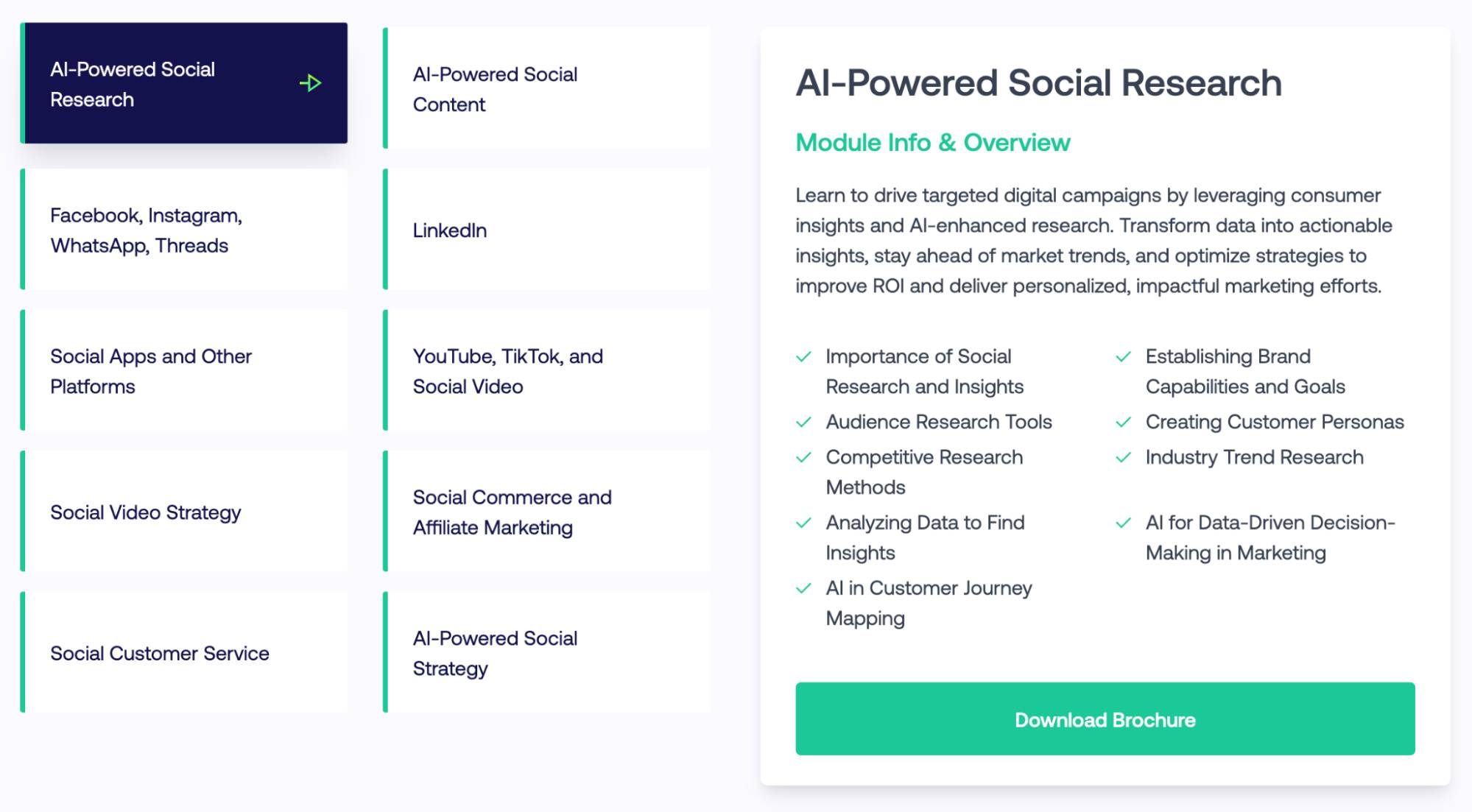
Every course is also guided by marketing experts from Google, Coca-Cola, Microsoft and more, so you know you’re learning from the best.
Modules: Some 10 modules cover areas such as AI-powered social media strategy and specific platforms like Facebook, Instagram, LinkedIn, YouTube and TikTok.
Course length: Around 27 hours (that takes 8–10 weeks on average) of self-paced learning.
Target audience: Anyone looking to advance or pursue a new career in digital marketing, fuel business growth or become a social media marketing specialist.
Teaching methods: Within DMI’s online learning hub, you’ll find a mix of articles, imagery and interactive content, with quizzes to complete and tutor support.
Certification: After passing a two-hour exam at the end of the course, learners receive a “DMI Specialist” certification. Those wanting to go further can work toward a Postgraduate Diploma in Digital Marketing.
Cost: A paid course that is sometimes discounted.
7. Email marketing course: Pipedrive Academy
Pipedrive Academy’s email marketing course is ideal for beginners who want a practical, results-driven introduction to email marketing.
It covers everything from growing a subscriber list to creating campaigns that get opened and clicked.
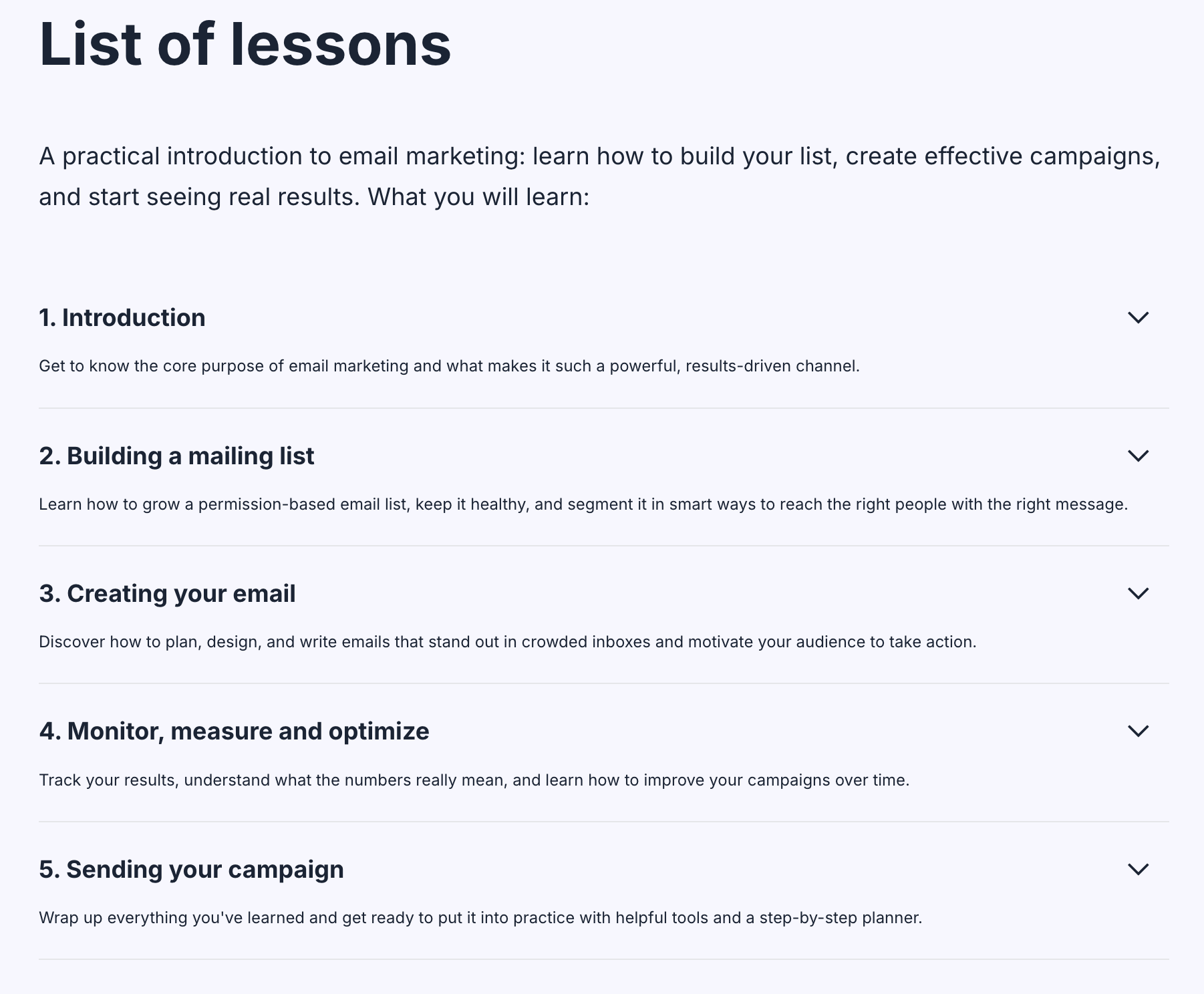
The course is led by Pipedrive’s in-house marketing and customer relationship management (CRM) experts, giving learners actionable guidance based on real-world sales and marketing workflows.
Note: You can use Pipedrive’s email marketing software to build a larger, more loyal customer base.
Modules: The 13-lesson program teaches list building, email creation, customer segmentation, performance tracking and campaign execution.
Course length: Around two hours, self-paced.
Target audience: Salespeople, marketers and business owners looking to run more effective email campaigns and improve engagement.
Teaching methods: On-demand video tutorials with step-by-step instructions, practical tips and campaign planners.
Certification: While learners don’t receive a certificate for this course, they benefit from a practical introduction before moving on to more specific Pipedrive Academy courses offering badges or certificates.
Cost: Free.
8. Learning PPC with Google Ads: LinkedIn Learning
LinkedIn Learning’s “Learning PPC with Google Ads” course gives beginners the practical skills to create, manage and optimize Google Ads campaigns that drive measurable business results.
It’s a great starting point for those new to PPC advertising (also known as paid search).
Entrepreneur and marketing strategy expert Duane Brown shows you how to build a traffic-boosting campaign from scratch.

Learn how to research keywords and write dynamic ad copy to get more clicks and conversions – ultimately boosting your return on investment (ROI).
Modules: Four core modules include an introduction to PPC, with lessons on keyword research, writing ad copy, launching your first campaign and optimizing it.
Course length: Just over one hour, self-paced.
Target audience: Business owners and marketers who want to learn how to use Google Ads (formerly Google AdWords) to increase traffic to their websites.
Teaching methods: Video tutorials, slideshows and real-life examples, with quizzes to test your knowledge.
Certification: Learners receive a LinkedIn “Certificate of Completion” after finishing the course.
Cost: A paid course or free with a one-month trial of LinkedIn Learning.
9. Digital marketing strategy: University of Edinburgh
edX’s digital marketing strategy course (by The University of Edinburgh) helps learners understand the modern digital landscape and develop their own data-driven strategy.
Lecturer Ewelina Lacka shows you how to plan and create compelling content that puts you ahead of your competitors.
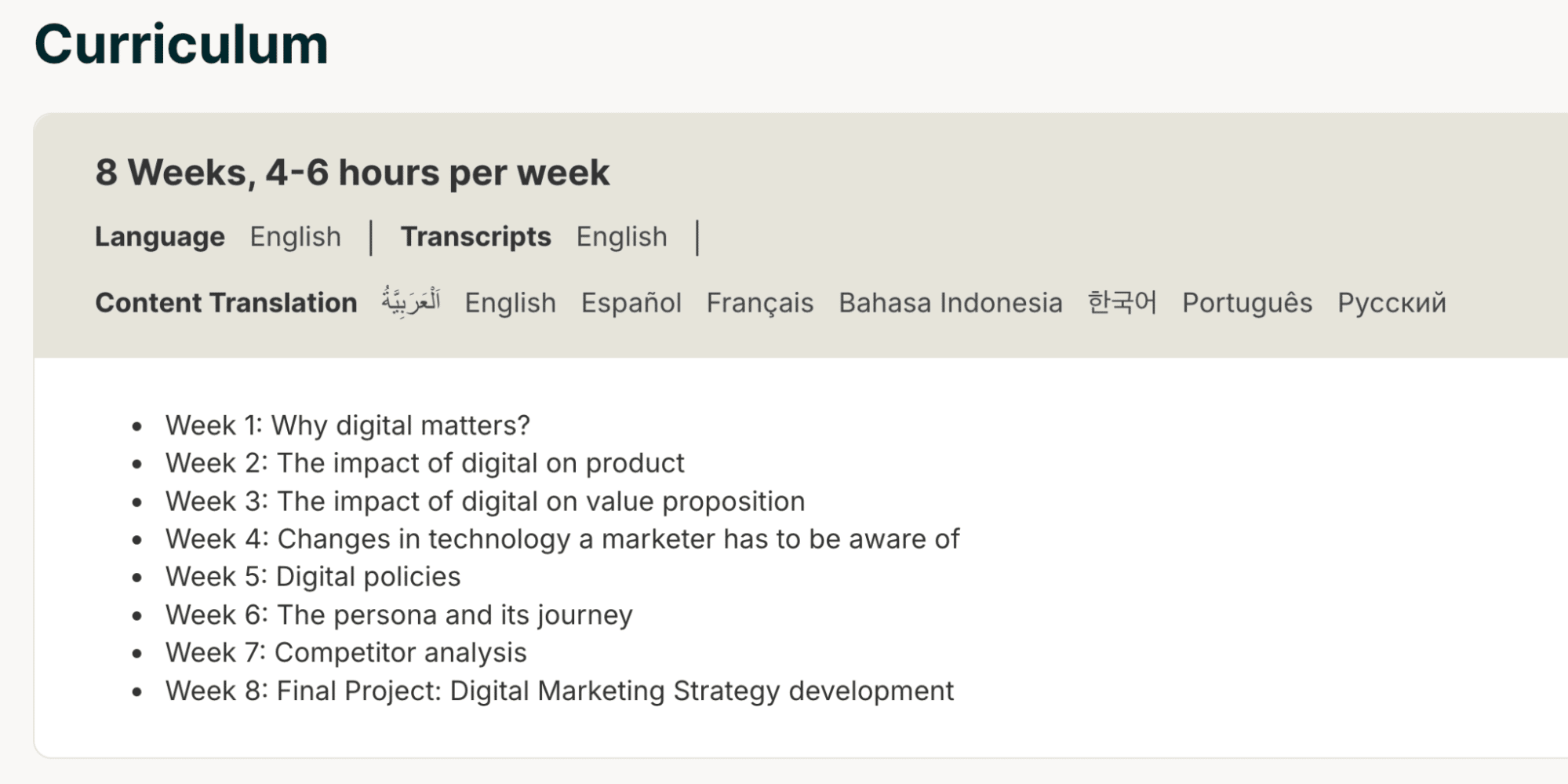
The course combines case studies, competitive analysis and persona development to provide a practical foundation for advancing your marketing career.
Modules: Eight lessons teach about digital impact on products and value propositions, technology shifts, policy and more.
Course length: Eight weeks (estimate based on 4–6 hours per week), self-paced.
Target audience: Intermediate learners with some prior marketing experience who want to build strategic skillsets.
Teaching methods: A series of video lessons, assignments and a “Final Project” at the end of the course guided by the University of Edinburgh faculty.
Certification: Learners on the paid version of the course receive a certificate upon completion.
Cost: A paid course with a free, limited version that doesn’t offer certificates.
10. Google data analytics professional certificate: Coursera
Coursera’s “Google Data Analytics Professional Certificate” is a beginner-friendly program designed to prepare learners for entry-level roles in data analytics.
SMB owners can use the learnings to determine the effectiveness of digital marketing campaigns and where to optimize them to drive growth.
Developed by Google experts, it combines technical training in Google Analytics with hands-on projects and career support.
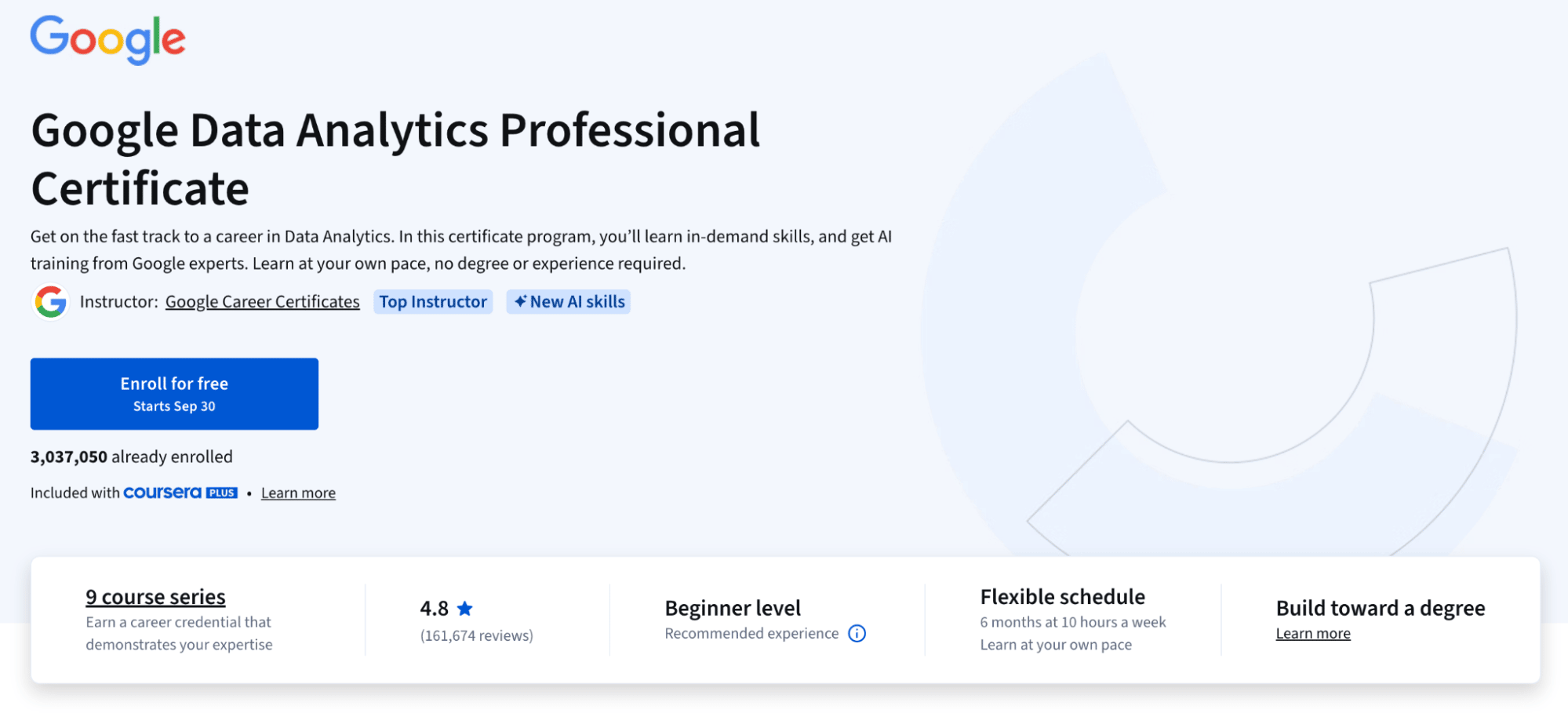
You’ll learn how to collect, clean and analyze data, including visualizing insights to make smarter business decisions.
Modules: Nine mini-courses cover data collection, cleaning, analysis and visualization, plus how to calculate for programming.
Course length: Around six months at 10 hours weekly, self-paced.
Target audience: Business owners and marketers who are new to marketing analytics and want to measure the performance of their marketing campaigns.
Teaching methods: Video lessons, interactive assessments, practice-based projects and a final case study to showcase skills.
Certification: Shareable career certificate from Google, recognized by 150+ employers including Deloitte, Target, Verizon and Google.
Cost: Coursera subscription required.
11. SEO link-building course: CXL
CXL’s SEO link-building course is built for marketers who want a sustainable, high-impact approach to link building that boosts authority and drives organic traffic.
The course is led by HubSpot’s Products Marketing Manager, Irina Nica, who has over a decade of experience in SEO and content marketing.
Instead of quick fixes or outdated tactics, it focuses on proven strategies that work at scale.
By the end of the course, you’ll be able to create content that naturally attracts high-quality backlinks and run outreach campaigns that get tangible results.
Modules: Some 15 lessons cover topics like prospecting, outreach, unlinked brand mentions, guest blogging, building free tools and more.
Course length: Approximately four hours, self-paced.
Target audience: SEO professionals, content marketers, digital PR specialists, growth marketers and anyone responsible for improving site authority.
Teaching methods: On-demand video tutorials with step-by-step frameworks, supported by practical examples.
Certification: Learners earn a CXL SEO Link Building Course Certificate, recognized by employers and shareable on LinkedIn.
Cost: Included with a CXL subscription (individual or team plans available)
What to look for in an online digital marketing course
To pick a digital marketing course that delivers real value, focus on the factors below to match one with your goals, schedule and learning style.
For example, someone switching from a retail role to digital marketing might need a beginner-friendly certificate course to build credibility with employers.
In fact, one study from Future Learn found that 81% of people who’d changed careers did so with help from online courses – proof that the right program can open real doors.
Here are six crucial factors to consider before investing your time and money:
Factors to consider | How to choose the right course |
Course content | Align modules with the digital marketing skills you want to learn and ensure prerequisites aren’t blocking you. Example: Beginner-friendly courses should start with high-level introductions and definitions. |
Course length | Short courses are good for refreshers, while longer courses provide depth and practice opportunities. Example: A 5-hour SEO basics course vs. a 12-hour advanced SEO course with exercises. |
Time demands | Self-paced courses let you learn on your own schedule. Live, hands-on courses require attendance at set times. Example: You may prefer on-demand video tutorials that you can pause instead of live webinars every Tuesday at 3 PM. |
Teaching methods | Consider whether you learn best via text, video, interactive digital media or in-person. Example: If you’re a visual learner who needs practice to memorize lessons, find a course with video lectures, worksheets and Slack support. |
Cost | Free courses exist, some more reputable than others. Paid programs often offer expert instructors, recognized certificates and higher-quality peer interaction. Example: A $200 certificate program from an industry-recognized provider ensures you learn new skills alongside real-world examples. |
Other deciding factors | Check reviews, case studies and recommendations. Look for practical advice, measurable outcomes and whether you get a digital marketing certificate at the end. Example: An Indeed review notes how a particular course helped a small business owner like you improve AI skills and save hours weekly. |
The right course isn’t just about price or prestige. It’s about fit.
Match the course’s content, length and format with your career goals and personal learning style to expand your skills and make career leaps.
Final thoughts
The right digital marketing course depends on your goals. If you’re just starting out, look for beginner-friendly modules and shorter formats that build confidence quickly.
If you’re aiming to advance your career, a certification program helps you stand out to employers.
For a fast, practical start, Pipedrive Academy offers free courses led by real-world experts.
Learn how to sell more and grow your business using Pipedrive with these easy-to-follow lessons.











